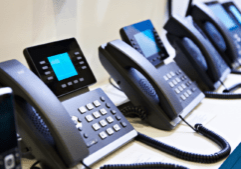
When summer hits New England, two things happen like clockwork: the beaches get crowded, and so do the phone lines in your medical office.
Between heatstroke, sprains, and surprise allergies, it seems like everyone wants to make an appointment with you today. And if your healthcare staff members are struggling just to keep up with all these patient calls, odds are it’s not their fault.
It’s probably your phone system. What many healthcare professionals are realizing is that, a lot of the options for phone systems for medical offices aren’t equipped to handle the heat. And you need to upgrade to one that can.
Let’s talk about what a “summer-proof” phone setup actually looks like and how the right system can help you survive the rush.
The Summer Problem (and Why Your Phones Feel It First)

In theory, medical offices prepare for summer. Schedules are adjusted, staff coverage is planned, and there’s plenty of iced coffee to go around. But even the best-laid plans fall apart when:
- Two nurses call out the same week
- The phones ring nonstop from 8 a.m. to 5 p.m.
- Patients leave voicemails, but nobody has time to listen to (or return) them
- That one provider who still faxes everything jams the line again
Outdated phone systems for medical offices might survive a quiet Tuesday in April. But when the summer surge hits, they buckle. After all, they weren’t designed with today’s healthcare organizations in mind.
They’re slow, limited, and prone to failure at the worst possible moment (like 4:59 p.m. on July 3rd). That doesn’t just limit your efficiency, it could also cost you patients. In fact, patients who have a poor phone experience are 4x more likely to switch to a different healthcare provider.
That’s why it’s time to switch to a summer-proof medical office phone system. Wondering what that actually looks like? Just keep scrolling.
What Makes Phone Systems for Medical Offices “Summer-Proof?”

Let’s be real. You’re not just looking for “phones.” You need medical communication tools that help you navigate the summer rush successfully. And modern, VoIP-based setups fit that bill.
Here’s what a scalable VoIP phone system offers medical practices:
1. It Can Route Calls Intelligently (Without Human Error)
Call routing shouldn’t depend on who’s sitting at the front desk. With VoIP for healthcare, calls can be directed based on time of day, location, provider schedule, or even patient input (press 2 for refills, 3 for billing, etc.). That means with the proper phone systems for medical offices, patients will experience fewer dropped calls and a better patient experience.
2. It Can Work Wherever Your Staff Is
Summer staffing is all over the map (literally). Between PTO, hybrid shifts, and temporary hires, your team isn’t always at the front desk. Thankfully, a cloud-based phone system ensures that your staff stays connected with unified communications platforms without compromising professionalism or patient privacy.
Here’s what that kind of flexibility looks like in the real world:
- Calls always show your clinic’s main number, not a personal device.
- Staff can contact patients without sharing their own cell phone numbers.
- Mobile and desktop access means fewer missed or dropped calls.
- Voicemail and call logs follow your on-call team wherever they are.
And when someone new joins or shifts locations? Updates take minutes, not three days and a service call. Which brings us to another point…
3. It Lets You Scale Without the Drama
Need more extensions during flu season? Want to set up a temporary line for your summer pop-up clinic? A scalable phone system makes it quick and easy to use. Instead of waiting two weeks for a technician (or buying more hardware than a local radio station), the right setup lets healthcare providers:
- Add or remove lines or extensions in minutes
- Spin up temporary numbers for mobile testing units, satellite offices, or seasonal staff
- Route calls differently based on staffing changes or clinic hours
- Pay only for what you use, so you’re not locked into a bloated system you’ll regret in the fall
You shouldn’t need a telecom engineering degree to keep your healthcare practice running smoothly. That’s why modern VoIP phone systems take the drama (and the cost) out of growth, so your clinic can flex when it needs to, and chill when it doesn’t.
Discover how Rhode Island Telephone’s phone systems for medical offices can also save you money →
4. It Lets You Handle Call Surges with Grace
Urgent care centers know this pain well: summer weekends bring bike accidents, heat exhaustion, and all the “I didn’t want to wait until Monday” phone calls. And it can bury your front desk team. The right phone system can spread the load with:
- Smart call distribution that prevents one person from getting swamped
- Overflow routing to off-site staff or voicemail-to-text during peak hours
- Call queue notifications so no patient gets left hanging for too long
Instead of panic mode every Monday morning, your team can handle spikes in call volume without breaking a sweat (or losing their patience).
5. It Guarantees Reliable Patient Communication, Even During Outages
Power flickers in coastal towns. Summer storms roll in. And don’t even get us started on internet outages. However, here’s the good news: Rhode Island Telephone’s phone systems for medical offices provide a geo-redundant infrastructure and can reroute your calls to an alternative location in the event of a disaster.
That’s not just good for the business side of small or large healthcare organizations. It’s also essential for providing consistent patient care.
Explore the best phone systems for medical offices in New England →
Got Questions? We’ve Got Answers

We know that you’ve probably got some lingering questions (after all, we would). So, these quick answers will help you prepare your healthcare center before the waiting room and your call queue overflow.
1. What features should I look for in a medical office phone system?
Look for features that support flexibility and speed, like:
- Auto-attendants to reduce wait times by guiding patients quickly
- Call queues for managing surges without losing calls
- Mobile access so staff can answer from anywhere
- Voicemail-to-text for quicker follow-ups
- Call routing rules that adjust to summer schedules
The key is to reduce call bottlenecks and keep communication flowing within your medical office, no matter how many people are out or where staff are located.
2. Will I need to buy new phones or hardware to upgrade?
Not necessarily. Many modern VoIP systems for healthcare work with your existing hardware or offer desktop and mobile apps that eliminate the need for new desk phones. If hardware is needed, it’s usually plug-and-play and easy to set up without rewiring the building.
3. Can a new phone system really help with staff shortages?
It won’t replace your front desk, but it will take pressure off them. Scalable phone systems let you route simple tasks, like confirming appointments or answering FAQs, through automated menus. That means your limited staff can focus on more urgent incoming calls and in-person needs.
4. Is this kind of system secure and HIPAA-compliant?
Yes, but not all systems are created equal. Make sure any provider offers:
- End-to-end encryption
- Secure voicemail access
- Call recording with user-level controls
- HIPAA business associate agreements (BAAs)
Rhode Island Telephone’s phone systems for medical offices are built with HIPAA compliance in mind. They’re healthcare phone systems that are designed specifically for medical use cases and patient confidentiality.
5. What happens if the internet goes out during a busy clinic day?
With the right setup, your calls can fail over to mobile phone numbers, backup medical practice phone lines, or even alternate locations. A good provider will help you create a redundant communication plan so patients can still reach you and your healthcare teams, even during outages.
6. How long does it take to switch to a new phone system?
In most cases, just a few days, sometimes less. Rhode Island Telephone handles the setup, porting your numbers, configuring your call flow, and training your staff. You won’t be stuck figuring it out alone (because nobody has time for that in July).
7. Is this overkill for a small practice with one or two phone lines?
Not at all. Small medical offices benefit from simple automation and flexibility even more, because there’s less margin for error. Effective communication tools like mobile access, auto-attendants, and call forwarding can dramatically improve your summer productivity without adding to your headcount.
Get Ahead of the Summer Surge with Rhode Island Telephone

Now’s the time to fix it before the calls pile up. Before the voicemails get lost. Before your administrative team starts Googling “new jobs with newer phones.”
It’s time to reach out to Rhode Island Telephone to help with reliable patient communication. We’ve been helping New England medical offices for decades. We know the local challenges because, well, we live here, too.
And we want to provide the best phone systems for medical offices without making things harder on your already-busy staff members. So, why wait to provide the ideal patient experience?
Request a telecom consultation with Rhode Island Telephone today. Because you (and your patients) deserve better than, “Can you call back in a few hours? Our phones are acting up again.”




